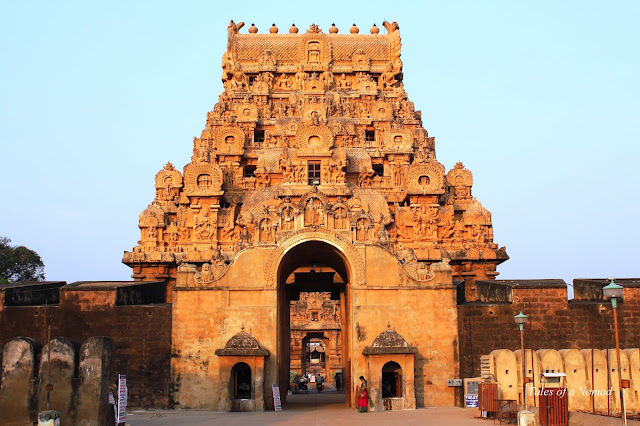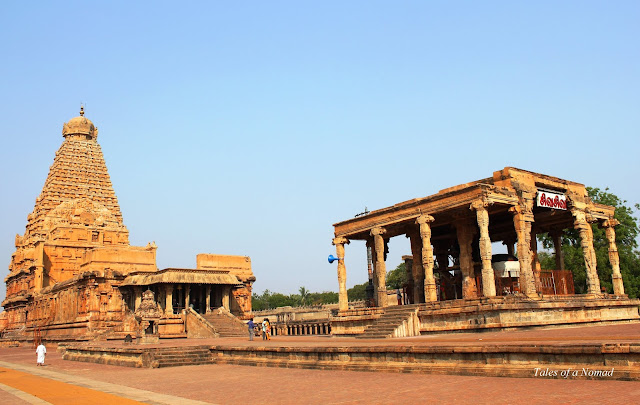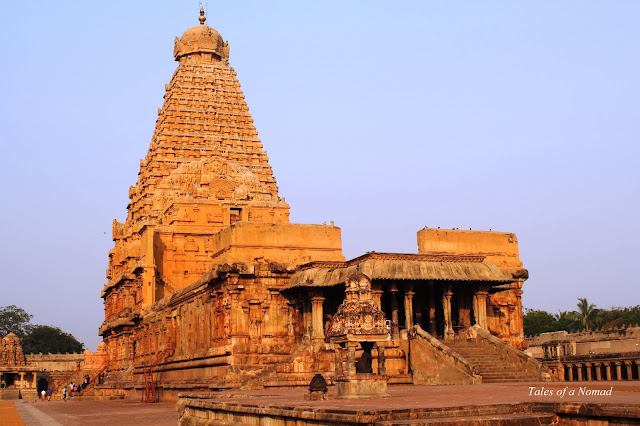One of the earliest and longest ruling dynasties of southern
India, the Cholas ruled between the 9th century and 13th
century even though there have been reports of their establishment much before
in 3rd century BC. Cholas expanded their kingdom and it is believed
they held sway over regions of Maldives, Sri Lanka and probably even
Malayasia and Indonesia. The empire reached its peak around the 11th
century when it was ruled by Rajaraja Chola I, the greatest of Chola kings and then by Rajendra
Chola, his son. The dynasty also left behind a great legacy in the form of some stupendous
temples adorned with magnificent sculptures and carvings. The Great Living
Chola Temples which is a UNESCO World Heritage site is a prime example of this. The site constitutes of three temples-
Brihadeeshwarar temple at Thanjavur, Airavateswarar temple at Darasuram and
Brihadeeshwarar temple at Gangaikondacholapuram. Built in typical Drvaidian
architecture, the three temples deeply signify the Chola style and ideology
with regard to architecture and art. All the three temples are located in the Cauvery
delta regions surrounding Thanjavur and Kumbakonam in Tamil Nadu.
Brihadeeshwarar temple, Thanjavur
Also referred as the Big temple or Periya kovil locally, Brihadeeshwarar
temple is the cynosure of all eyes visiting Thanjavur. Built in early 11th
century by Rajaraja Chola I, the temple is located within Shivganga fort in the
city and has a moat running around it. It was built and designed to represent a
cosmic structure- the Mahameru (a sacred 5 peak mountain) and had granite
blocks being brought from more than 50 Kms away for its construction. The two
large entrance gates dedicated to Karalantakan and Rajaraja Chola I are extensively
carved with beautiful sculptures of figurines and mythological characters. The
second thiruvasal (entrance gate) opens into the sprawling courtyard of the
temple with the intimidating 13 storeyed gopuram of the main shrine garnering
all attention. Spread over 33,000 sq ft, the temple is dedicated to Shiva and
has a large shivlinga as the main shrine. The vimana or tower above the main sanctum is
extensively and intricately carved and also has an 80 tonne carved granite
block atop it. While the inner walls are devoid of carvings, the outer façade of
the main shrine is adorned with extensive chisel work. Apart from the carvings
that depict various mythological stories and characters, there are also
inscriptions of various rulers. The temple has a wide circumambulatory path
which is lined with pillared pathways all along. The complex also houses
numerous other shrines dedicated to Chandikesvara, Ganesha, Varaha, Karuvur
Devar, Nataraja etc. However, the shrines of Subramanya, Amman and the colossal
Nandi are the ones which have beautiful frescoes and sculptures. The temple underwent numerous repairs and
renovations during the rule of later dynasties and even had a few shrines added
in the same period. The temple looks gorgeous during sunrise and sunset when the backdrop is bathed in shades of yellow, orange and red.
Location: In Thanjavur city
Airavateswarar temple, Darasuram
Named after Indra’s vehicle, Airavat (elephant), the temple
is dedicated to Airavateswarar and Shiva. Built in the 12th century
by Rajaraja Chola II, the temple is located in Darasuram near Kumbakonam and is a
part of a cluster of medieval temples in the same region. The temple is surrounded
by a moat and is located inside a well kept garden with a nandi mandapa just
outside the courtyard. It has a beautifully sculpted entrance gate and a pathway
inside which runs all along with numerous carved pillars. The main sanctum
which is extensively sculpted is on a raised platform which is in the shape of
a chariot pulled by horses and is a smorgasbord of sculptures. The outer façade
has intricate sculptures of mythological characters and the steps that lead up
the raised platform too have carvings on them. The platform which leads to the
inner sanctums has innumerable ornate pillars with astounding carvings and
sculptures which are intricate and depict stories related to Shaivism and
Vaishnavism. These sculpted pillars are magnificent and are truly one of
the highlights of this temple. The ceilings too have beautiful carvings, most of which have worn out. The temple is also adorned with numerous small sculptures of various deities
and has inscriptions on its walls. The extensive detailing is the stand out
feature of Airavateeshwarar temple, which makes it at par or a notch above the
big temple at Thanjavur with regard to the stone works. The complex supposedly
had more courtyards and structures when it was built, but most of those got
ruined over the years.
Location: 36 Kms from Thanjavur and 4 Kms before Kumbakonam
Brihadeeshwarar temple, Gangaikondacholapuram
When Rajendra Chola I became the king of Chola dynasty, he
shifted the capital from Thanjavur to Gangaikondacholapuram to commemorate his conquest
up to the banks of river Ganga. Located in the nondescript village of
Gangaikondacholapuram, the Brihadeeshwarar temple here is modeled on the big temple in
Thanjavur. The complex is set inside a neatly maintained lawn with sporadic
trees. The main shrine dedicated to Shiva has a square plan with a tower atop
the inner sanctum. The tower has sculptures all over similar to the
Brihadeeshwara temple in Thanjavur but is nine storeyed instead of thirteen. The
outer façade has innumerable sculptures of gods and other mythological
characters. There is a huge nandi sculpture in front facing the temple. Th premise also has a few other shrines dedicated to various deities. Though it is built similar to the one in Thanjavur, it fails to match up to the
architectural extravagance of the big temple.
Location: 72 Kms from Thanjavur and 32 Kms from Kumbakonam
Navigator:
Thanjavur is 59 Kms from Tiruchirappalli, 190 Kms from
Madurai and 346 Kms from Chennai. The nearest airport is at Tiruchirappalli.
There are frequent trains and buses connecting Thanjavur with all the major
towns in south India. Thanjavur and Kumbakonam are 40 Kms apart.
Food and Accommodation:
It is recommended to stay at Thanjavur and travel to all the
three temples. Thanjavur has numerous hotels and restaurants. There are small
make shift shops outside these temples.





























Beautiful temples. Nice description and photos.
ReplyDeleteThank you, Aravind.
DeleteReal amazing and advanced architecture of the temples. Your photo shots highlighted it's richness and dedication.
ReplyDeleteThank you so much.
DeleteBeautiful :)
ReplyDeleteGlad you liked it.
Delete